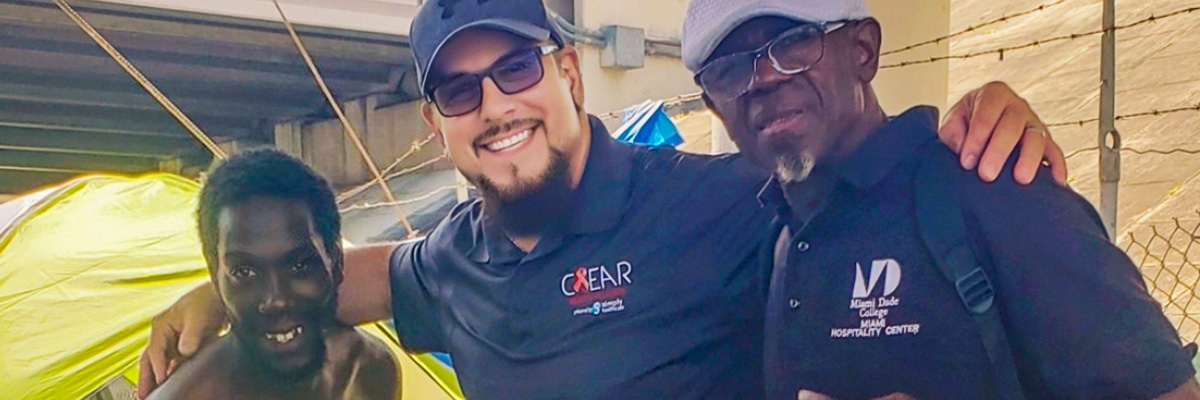Rudy Hernandez sits down at his desk each morning and sips his coffee as he opens his laptop and checks for names of people who checked into the hospital overnight. Rudy works for Clear Health Alliance (CHA),a Medicaid specialty plan that supports better health for people living with HIV/AIDS. As an Outreach Care Specialist for CHA, a Managed care Organization, he plays a vital role in connecting patients who are difficult to reach with healthcare, and that includes individuals with HIV/AIDS who are experiencing homelessness.
As an employee of CHA, a Managed Care Organization, Rudy is collaborating with the Homeless Trust in an unprecedented way to coordinate housing and healthcare services with the Homeless Trust. When he identifies a patient as unsheltered, he connects them with the Homeless Trust’s continuum of services that can provide the housing and support individuals need to attend to their medical situation. That means on any given day, Rudy may be at his desk one moment and the next he’s out searching for a discharged, unhoused person who’s in the CHA insurance plan.
Rudy can’t help but feel a deep sense of compassion for people experiencing homelessness. When he was young, Rudy and his family fled Cuba and arrived in the United States with nothing but clothes on their backs. Like so many immigrants they eventually found their footing. Rudy went on to get an education and become a healthcare professional, and now he is using his expertise to help others who are facing similar struggles.
Here’s more about Rudy, his job, and the unique role it is playing in the Homeless Trust Continuum of Care.
Q: What drives your compassion for people who are experiencing homelessness?
“We were poor and we were homeless for about five days…I still remember it. I think that's why I was born for this type of job. I was born to do this.”
Q: What do you do when you receive a referral and you find out they are experiencing homelessness?
“Whenever Clear Health Alliance has a new patient (that could be homeless) the first thing I do is research everything that has happened with that person… we get information about their case. I study different admissions they’ve had in the past. Then I start searching to see if I can get anyone - friends or family members - to help me find and contact the patient. If I can't, then I hit the road to find them!”
Q: You are like a detective! How do you reach people who are experiencing homelessness?
“I have some boots on the ground that are actually homeless members that I call, so I try to locate them that way. We also have connections with Homeless Trust-funded organizations, like New Hope CORPS. So, whenever I'm looking for someone, I call them and they look for them too.”
Q: Who has been a big influence in your life to continue to do what you do?
“My grandmother was a full-blown believer of God, you know. And I took care of her for about two years…I learned about God. I learned to love God. I learned of the power of having him in your life, of trusting. I learned to care for people. I learned to understand people better. I can’t turn my back on it. I would be going totally against me. So, it gives me joy, a lot of joy, that God has sort of blessed me with this and bestowed so much in my life.”
Q: What do you do when someone denies your assistance?
“It’s a very difficult population to work with… a little bit overwhelming at times or maybe a lot because you try and you try and you try and a lot of times it’s very difficult. Other times, you know, they're just not ready… there are a lot of difficult times with my job, especially when a member of mine dies… and I have to say, I can't stop feeling pain. But even though it hurts, I am not allowing myself to get jaded. There’s so much work to be done. The truth is that many in this population suffer from chronic substance abuse issues, so I do not let go easily. If I can convince them to go into a residential treatment Program, where they are given the tools to overcome their illness and strive to reach their full potential, their chance of being successfully placed in housing increases substantially. When that happens – that’s a good day.”
If you know someone experiencing homelessness who has HIV/AIDS, recommend they call 1-877-994-4357.



